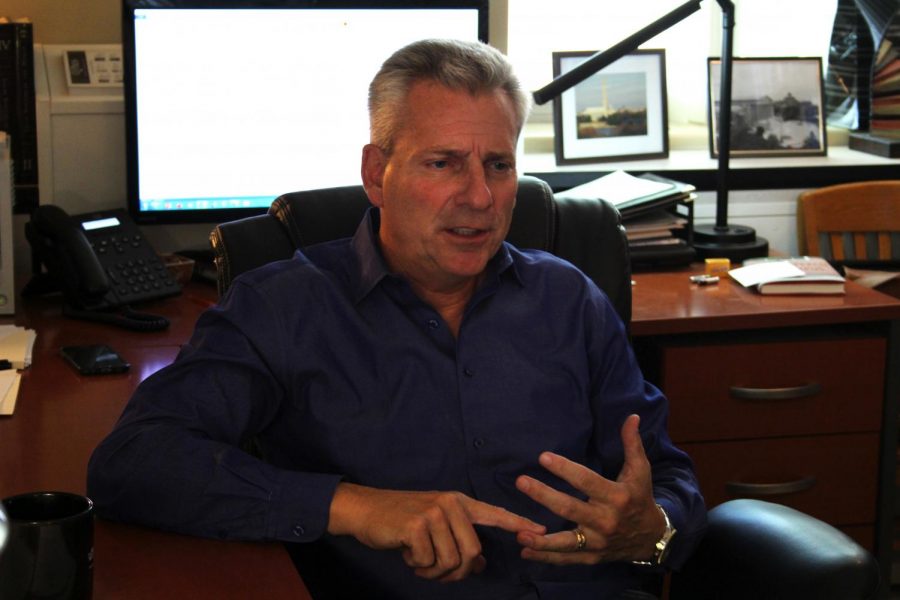Health care is not a universal human right
Being entitled to a doctor’s labor infringes on their individual liberty to practice medicine on own time
KIERSTEN BUTTERWORTH | THE DAILY EVERGREEN
Professor Cornell Clayton dives into the idea of “just deserts,” where people who work more deserve to be rewarded Aug. 28 in Johnson Tower.
September 4, 2018
When you say “health care is a right,” to what extent are you willing to defend that statement?
Philosophically speaking, I would say that argument doesn’t go very far.
It’s one thing to argue for a legal statute entitling all people to be medically treated when necessary. However, defining health care as a basic human right is debatable.
If you have been keeping up with my writing, you would know my values seem very conservative. While true, I prefer the term “classically liberal,” also known as libertarian.
The libertarian philosophy is centered on the principle of nonaggression. To sum it up briefly, how you decide to use your personal freedoms is your own business. The only exception is that you cannot violate the life, liberty or property of another individual.
This reasoning has been used to help legalize prostitution, gambling, marijuana use and same-sex marriage throughout the country. If there is no victim involved, the philosophy’s standards are met.
This set of ethics became popular through English philosopher John Locke. In fact, it was so popular it acted as a pillar for the founding of our country.
Locke believed there are such things as natural rights – liberties you are entitled to as a human and an individual. This is apparent in the Declaration of Independence:
“We hold these truths to be self-evident, that all men are created equal, that they are endowed by their creator with certain unalienable rights that among these are life, liberty and the pursuit of happiness.”
A violation of these rights would go against the principle of nonaggression. This is where health care falls short.
If health care is a human right, you would be entitled to it as an individual. However, the practice of health care is a decision reserved for the provider’s personal liberty. Therefore, you would be saying your “right” to have service is more important than the actual human right to accept or decline a request of your labor.
Knowing I’d find a different perspective on the issue, I decided to reach out to a WSU author and government professor, Cornell Clayton. Clayton explained how today’s philosophers don’t often think in terms of natural rights. To rationalize the belief that health care is a right, Clayton brought up John Rawl’s “Veil of Ignorance.”
Behind this veil, you know nothing of your natural abilities and class in society. You have no knowledge of your gender, race, nationality or personal preferences. This is known to be a great mindset for determining what is fair in society and what your rights truly are.
“In a society like ours, there is a moral obligation to provide health care for those that can’t afford it,” Clayton said.
This is the conclusion he says the veil might bring you to, especially with consideration to marginalized people.
Using this tool, you may also come to the same conclusion Clayton did as well. After all, America is in the habit of being considerate of minorities, which isn’t necessarily bad.
Yet, the smallest minority is and will always be the individual. On this foundation, ends do not justify means if means violate anyone’s personal liberty. In other words, you cannot support the rights of any minority without first supporting the rights of the individual.
Back to my first question: To what extent would you say health care is a right?
If the whole country went broke and a doctor had to be dragged out of his house and forced to use his skills without consent or compensation would that be justified? Probably not.
This isn’t to say that finding a modern-day healthcare solution is unrealistic, but the language often used to advocate for it is unjustifiable.
In conclusion, your basic human rights of life, liberty and the pursuit of happiness are sacred. It is insulting to those common values to even suggest you’re entitled to someone else’s labor.
That’s called slavery and it’s frowned upon in most societies. Perhaps it’s time we find a new campaign slogan.








